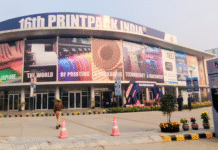Wednesday 29 April 2020, London – The shortlist for the Wolfson History Prize 2020, the most valuable non-fiction writing prize in the UK, has been announced today, recognizing the best factual history writing from the past year. The winner of the Wolfson History Prize 2020 will be announced on Monday, 15 June 2020, in a virtual ceremony. The winner of the Wolfson History Prize, the most valuable non-fiction writing prize in the UK, will be awarded £40,000, with each of the shortlisted authors receiving £4,000.
This year’s shortlist has a distinctly global focus, with five of the six titles exploring non-British history. International topics covered in the shortlist range from a human history of the oceans, to an exploration of Chaucer’s relationship with Europe, to a history of West Africa from the rise of the slave trade to the age of revolution to looking at Anglo-Indian relations through the untold history of the first All India cricket team, to a seminal study of the impact of the bible on world religions and cultures. Meanwhile, the only exclusively British history on the 2020 shortlist sheds light on the untold lives of the women killed by Jack the Ripper.
History soars in popularity
The shortlist announcement comes as historical non-fiction sees a 14% uplift in sales over the past five years, with World History experiencing phenomenal growth in the UK, with a 92% increase in book sales since 2015, according to new data from Nielsen Book.
The books shortlisted for the Wolfson History Prize 2020 are –
· The Boundless Sea: A Human History of the Oceans (Allen Lane) by David Abulafia
· A History of the Bible: The Book and Its Faiths (Allen Lane) by John Barton
· A Fistful of Shells: West Africa from the Rise of the Slave Trade to the Age of Revolution (Allen Lane) by Toby Green
· Cricket Country: An Indian Odyssey in the Age of Empire (Oxford University Press) by Prashant Kidambi
· The Five: The Untold Lives of the Women Killed by Jack the Ripper (Doubleday) by Hallie Rubenhold
· Chaucer: A European Life (Princeton University Press) by Marion Turner
Chair of the judges and president of the British Academy, David Cannadine, said of the shortlist, “This year’s shortlist has a decidedly global theme. The list is a demonstration of the range and quality of history writing in the UK today, both within and without academia. These are books that engross, challenge and delight – and which draw the readers into worlds as diverse as Indian cricket, Victorian London, and the kingdoms of West Africa. I am very grateful to my fellow judges for their time and wisdom, and it is with great enthusiasm that we announce the shortlist for 2020.”
Paul Ramsbottom, chief executive of the Wolfson Foundation, which awards the Prize, commented, “The Wolfson History Prize is awarded by the Wolfson Foundation as an expression of the importance of history to the life of the country. The Prize recognizes books that brim with brilliance and that break new ground in our understanding of past societies across the globe. These are books which are compellingly written to appeal to all.
We are living in a strange and unsettling moment, but the value of books and reading is perhaps emphasized as never before during lockdown – when many of us are looking for distraction, entertainment and education.”
The Boundless Sea: A Human History of the Oceans by David Abulafia is an exploration of the relationship between mankind and the seas throughout history, tracing our interaction with the oceans from the Polynesians of the Pacific, one of the earliest seafaring societies, to now. In A History of the Bible: The Book and Its Faiths, John Barton tackles a similarly vast topic, charting the history of the bible from its origins to its interpretations today, examining who its authors were, how its interpretations have evolved over time, and the interplay between religion and text.
A Fistful of Shells: West Africa from the Rise of the Slave Trade to the Age of Revolution by Toby Green similarly looks at how later generations reinterpret history, and how this can result in a collective ignorance of entire countries’ pasts. Exploring the history of pre-colonial West Africa, Green dismantles the Western notion that Africa had little history before European colonization, and reveals the rich and complex history of the region over a thousand years.
Meanwhile, more focused studies of the importance of individuals and specific historical periods, which had a significant impact on history, include The Five: The Untold Lives of the Women Killed by Jack the Ripper by Hallie Rubenhold. Shortlisted for the Wolfson Prize, the book is a nuanced reframing of the narrative around the infamous Victorian serial killer that shifts the focus to the victims and their lives, providing an insight into the five women whose identities have largely been obscured by our cultural obsession with the Ripper’s identity.
In Chaucer: A European Life, Marion Turner likewise queries how we traditionally view “well-known” historical figures and stories, shining a light on the distinctly European influences that shaped the life and work of The Canterbury Tales author. By following Chaucer’s adventures across Europe, Turner reveals how the “father of English literature” was a cosmopolitan figure influenced heavily by the Continent. The nominated biography casts both his writing and his historical legacy into a new light while showing that Chaucer’s life and writings have much to teach anyone with interest in European cultural history.
Finally, Prashant Kidambi’s Cricket Country: An Indian Odyssey in the Age of Empire, the first All India cricket tour of Great Britain and Ireland during the coronation summer of 1911 is a prism through which to explore colonial relations, the last days of the British Empire, and the beginning of Indian nationhood.
The Wolfson History Prize is run and awarded by the Wolfson Foundation, an independent charity that awards grants in the fields of science, health, education, arts and humanities. Mary Fulbrook won the Wolfson History Prize 2019 for her exploration of justice in the wake of World War Two, Reckonings: Legacies of Nazi Persecution and the Quest for Justice.























This is a terrific shortlist and at this time of staying at home more of us should rush out and buy (or order) at least one of these books. I happen to be reading Evan’s biography of the historian Eric Hobsbawm right now. (Evans is I believe one of the trustees or jurors of the Wolfson Prize.) It’s a long book but invaluable in understanding the academic and personal and political surroundings of one of the great social historians. Of course, we went to hear him speak at the Habitat Centre when he came to India a few years ago but I wish I had read this biography when SL and PA were still alive. It would have been great fun to discuss Hobsbawm’s ideas and way of writing and thinking about history with them who had actually read all of Hobsbawm’s books. In fact, my copy of Evan’s biography of EH is inherited from SL’s library.
1 May 2020. My comment that is only peripherally linked to the Wolfson prize is really based on my progress through Evan’s biography of Hobsbawm. It’s called Eric Hobsbawm A life in History. I know Evan’s work a bit from having read his biography of Deng, called Deng Xiao Peng and the Making of Modern China. This is a book that is hardly listed in his works even on the net while many of his books about Germany and Hitler are listed. Evans himself becomes even more interesting to me when I see that he studied in Hamburg also and this implies both a link and empathy with Hobsbawm who was a child in Germany in the late 1920s are early 1930s and grew up there as Hitler was coming to power. While the bio describes Hobsbawm’s professional and personal struggles, one is moved not only by his cosmopolitanism but Evan’s commentary on the academic politics of the times. Evans is very generous in his praise of Hobsbawm as the best historian of our times.
I write this very personal comment as a person who learned at the recent Jaipur Literary Festival and the Jaipur BookMark that runs with it, in the background, that it is very important for industry professionals to praise the shortlist. Literary prizes come and go and they have become more diverse in terms of genre, ethnicity, age, gender, and almost every other criteria and this is a good thing. The diversity of shortlists nowadays is a goldmine for readers while it may not actually increase book sales as many publishers and authors may be hoping. And in my own case, while I am not rushing to order the shortlisted books of the various prizes coming up, I have been inspired to look at the stacks of books that I have purchased over the last few years and to actually read. The lockdown has somehow contrived to allow more time for reading although I am working full time from home.